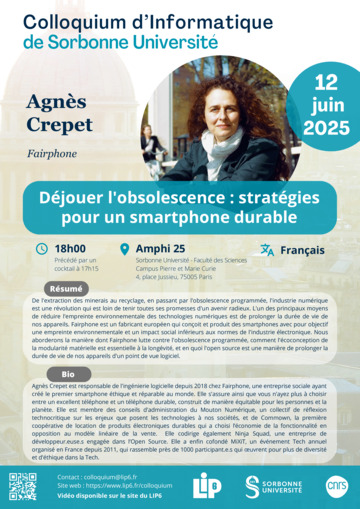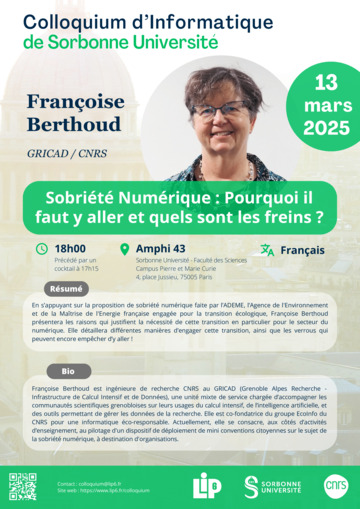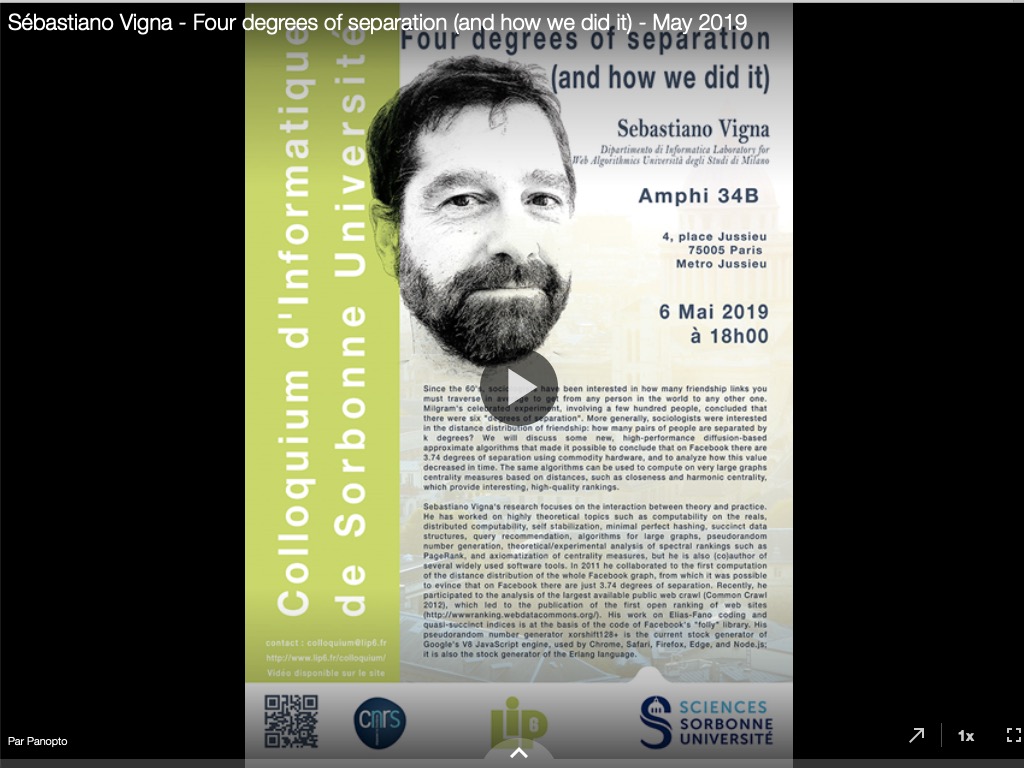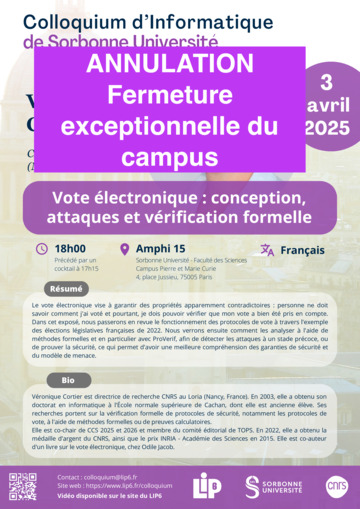Colloquium d’Informatique de Sorbonne Université
Sébastiano Vigna, Dipartimento di Informatica Laboratory for Web Algorithmics Università degli Studi di Milano
Four degrees of separation (and how we did it)
Sebastiano Vigna's research focuses on the interaction between theory and practice. He has worked on highly theoretical topics such as computability on the reals, distributed computability, self-stabilization, minimal perfect hashing, succinct data structures, query recommendation, algorithms for large graphs, pseudorandom number generation, theoretical/experimental analysis of spectral rankings such as PageRank, and axiomatization of centrality measures, but he is also (co)author of several widely used software tools. In 2011 he collaborated to the first computation of the distance distribution of the whole Facebook graph, from which it was possible to evince that on Facebook there are just 3.74 degrees of separation. Recently, he participated to the analysis of the largest available public web crawl (Common Crawl 2012), which led to the publication of the first open ranking of web sites (http://wwwranking.webdatacommons.org/). His work on Elias-Fano coding and quasi-succinct indices is at the basis of the code of Facebook's "folly" library. His pseudorandom number generator xorshift128+ is the current stock generator of Google's V8 JavaScript engine, used by Chrome, Safari, Firefox, Edge, and Node.js; it is also the stock generator of the Erlang language.
Since the 60's, sociologists have been interested in how many friendship links you must traverse in average to get from any person in the world to any other one. Milgram's celebrated experiment, involving a few hundred people, concluded that there were six "degrees of separation". More generally, sociologists were interested in the distance distribution of friendship: how many pairs of people are separated by k degrees? We will discuss some new, high-performance diffusion-based approximate algorithms that made it possible to conclude that on Facebook there are 3.74 degrees of separation using commodity hardware, and to analyze how this value decreased in time. The same algorithms can be used to compute on very large graphs centrality measures based on distances, such as closeness and harmonic centrality, which provide interesting, high-quality rankings.
Master Class
L'un des moment particulièrement apprécié lors du colloquium est la « Masterclass » au cours de laquelle quelques doctorants du laboratoires ont l'opportunité de présenter leurs travaux à l'invité(e). Chaque présentation est suivie d'une discussion approfondie. Le programme complet est donné dans le document suivant.
À propos
Initié en 2012, le Colloquium d’Informatique de Sorbonne Université est un évènement régulier ayant pour but d'inviter des personnalités majeures du domaine de l’informatique à donner une conférence sur le campus de la faculté des sciences et ingénierie de Sorbonne Université. Il vise un public large, divers mais techniquement averti, et notamment les chercheurs en informatique de toutes spécialités, les doctorants et les étudiants en informatique de niveau Master.
L’évènement principal du Colloquium est l’exposé de l’orateur, d’environ 45 minutes, suivi d’une séance de questions et d’interactions avec l’auditoire. Il est généralement associé à l’organisation d’une masterclass à destination des doctorants du LIP6 et/ou d’autres laboratoires.
Principal participant au comité d’organisation, le LIP6 assure l’organisation du Colloquium et reçoit occasionnellement le soutien de l’ISIR.
Comité de Pilotage
- Cécile Braunstein
- Pierre-Evariste Dagand
- Binh-Minh Bui-Xuan
- Bertrand Granado
- Marie-Jeanne Lesot
- Nicolas Maudet
- Antoine Miné
- Fanny Pascual
- Nicolas Perrin
- Olivier Schwander
- Laure Soulier
- Julien Tierny
Contact: Maximilien Danisch
Annonce des Colloquium
Si vous ne souhaitez plus être informé des événements, vous pouvez vous désinscrire de la liste de diffusion
- Année 2025 – 2026
- Année 2024 – 2025
-
 Agnès Crepet
Agnès Crepet
12 juin 2025
Déjouer l'obsolescence : stratégies pour un smartphone durable -
 Françoise Berthoud
Françoise Berthoud
13 mars 2025
Sobriété Numérique : Pourquoi il faut y aller et quels sont les freins ? -
 Sandrine Blazy
Sandrine Blazy
26 novembre 2024
Compilation vérifiée : vers du logiciel zéro défaut -
 Hans Bodlaender
Hans Bodlaender
10 octobre 2024
Parameterized Algorithms and Complexity Classes
-
- Année 2023 – 2024
-
 Maurice Herlihy
Maurice Herlihy
25 juin 2024
Further Decentralizing Decentralized Finance -
 Jean-Marc Jézéquel
Jean-Marc Jézéquel
04 avril 2024
Comment dompter la variabilité du logiciel ? -
 Claire Mathieu
Claire Mathieu
24 janvier 2024
Vehicle routing and approximation algorithms -
 David Bol
David Bol
21 novembre 2023
Six of the nine planetary boundaries are transgressed – How we do research in the Anthropocene?
-
- Année 2022 – 2023
- Année 2021 – 2022
- Année 2020 – 2021
- Année 2019 – 2020
- Année 2018 – 2019
-
 Cláudio T. Silva
Cláudio T. Silva
11 juin 2019
Urban Data Science -
 Sébastiano Vigna
Sébastiano Vigna
06 mai 2019
Four degrees of separation (and how we did it) -
 Hugo Gimbert
Hugo Gimbert
19 mars 2019
Les algorithmes de Parcoursup -
 Julie Grollier
Julie Grollier
05 février 2019
Nanodevices for Bio-inspired Computing -
 Jacques Pitrat
Jacques Pitrat
20 novembre 2018
L'IA forte -
 James Larus
James Larus
23 octobre 2018
Programming Non-Volatile Memory
-
- Année 2017 – 2018
-
 Eric Horvitz
Eric Horvitz
20 juin 2018
AI Aspirations and Advances -
 Justine Cassell
Justine Cassell
15 mai 2018
Designing Bots, Virtual Humans, and Other Systems that Can Hold up Their End of the Conversation -
 Léon Bottou
Léon Bottou
06 mars 2018
Une approche géométrique de l'apprentissage non supervisé -
 Jean-Luc Schwartz
Jean-Luc Schwartz
16 janvier 2018
Modélisation cognitive des unités de la parole -
 Timothy Roscoe
Timothy Roscoe
30 novembre 2017
The Trouble with Hardware
-
- Année 2016 – 2017
-
 Simon Peyton Jones
Simon Peyton Jones
23 mai 2017
Escape from the ivory tower: the Haskell journey -
 Maria Chudnovsky
Maria Chudnovsky
25 avril 2017
Induced subgraphs and coloring -
 Philippa Gardner
Philippa Gardner
28 mars 2017
Understanding and Verifying JavaScript Programs -
 Michel Beaudoin-Lafon
Michel Beaudoin-Lafon
28 février 2017
Interfaces Homme-Machine -
 Marie-Paule Cani
Marie-Paule Cani
22 novembre 2016
Modélisation 3D expressive -
 Richard Stallman
Richard Stallman
11 octobre 2016
What Makes Digital Inclusion Good Or Bad? -
 Patrick Cousot
Patrick Cousot
29 septembre 2016
Abstract interpretation
-
- Année 2015 – 2016
-
 Patrick Flandrin
Patrick Flandrin
16 juin 2016
« Chirps » everywhere -
 Aude Billard
Aude Billard
12 avril 2016
Robots that exceed human capabilities -
 Willy Zwaenepoel
Willy Zwaenepoel
22 mars 2016
Really Big Data -
 Jon Crowcroft
Jon Crowcroft
19 janvier 2016
Cybersecurity and network measurement -
 Isabelle Collet
Isabelle Collet
24 novembre 2015
Les informaticiennes, de la dominance de classe aux discriminations de sexe -
 Xavier Leroy
Xavier Leroy
20 octobre 2015
Desperately seeking software perfection
-
- Année 2014 – 2015
-
 Silvio Micali
Silvio Micali
26 mai 2015
Proofs, Secrets, and Computation -
 Alessandra Carbone
Alessandra Carbone
14 avril 2015
The new era of biology is computational -
 Serge Abiteboul
Serge Abiteboul
24 février 2015
Toward personal knowledge bases -
 Manuel Silva
Manuel Silva
25 novembre 2014
Fluidization of discrete event models or a marriage between the discrete and the continuous -
 Andrew S. Tanenbaum
Andrew S. Tanenbaum
28 octobre 2014
MINIX 3: A Reliable and Secure Operating System
-
- Année 2013 – 2014
-
 Donald Knuth
Donald Knuth
17 juin 2014
Computer Science: All Questions Answered -
 Jeannette Wing
Jeannette Wing
20 mai 2014
Toward a Theory of Trust in Networks of Humans and Computers -
 David Patterson
David Patterson
06 mai 2014
Myths about MOOCs and Software Engineering Education -
 Claude Berrou
Claude Berrou
25 mars 2014
L'information mentale -
 Vint Cerf
Vint Cerf
04 mars 2014
On the Preservation of Digital Information -
 C.A.R. (Tony) Hoare
C.A.R. (Tony) Hoare
26 novembre 2013
Laws of concurrent system design -
 Gilles Dowek
Gilles Dowek
22 octobre 2013
Are formal methods the future of air traffic control?
(Is there an autopilot on board?)
-
- Année 2012 – 2013
-
 Mathieu Feuillet, Camille Couprie, Mathilde Noual
Mathieu Feuillet, Camille Couprie, Mathilde Noual
25 juin 2013
Espoirs : Winners of the 2012 Gilles Kahn prize -
 Robert Sedgwick
Robert Sedgwick
23 mai 2013
Taking Education Online: A Unique Opportunity for the New Millenium -
 Frans Kaashoek
Frans Kaashoek
18 avril 2013
The multicore evolution and operating systems -
 Stuart Russell
Stuart Russell
22 janvier 2013
Unifying logic and probability: A “New Dawn” for Artificial Intelligence? -
 Georges Gonthier
Georges Gonthier
27 novembre 2012
Le génie mathématique, du théorème des quatre couleurs à la classification des groupes -
 Gérard Berry
Gérard Berry
24 octobre 2012
Le temps et les événements en informatique
-
- Année 2011 – 2012













